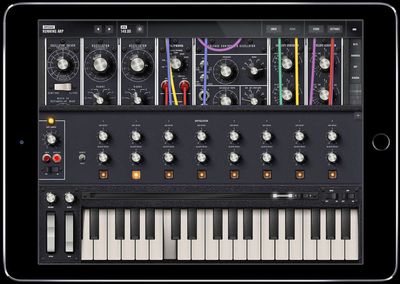Moog Music has brought its legendary $10,000 Model 15 analog synthesizer to iOS with the launch of the $30 Model 15 app.
The digital version of the analog modular synth is a one-to-one recreation of the iconic Model 15 from 1973, with a scalable interface that features gestural support for oscillators, low/high-pass filters, a looping recorder, full MIDI integration, ping-pong delay module, and numerous patch cables among the various knobs and switches.

The Model 15 ships with over 160 unique presets, a 1150 ribbon controller, 8-step sequencing arpeggiator, as well as the award-winning Animoog keyboard with 22 built-in scales and polyphonic modulation capabilities.
The Model 15 app supports Inter-App Audio and external MIDI controllers, and comes with Apple Pencil support for iPad Pro owners. The app was built using Apple's Metal low-level graphics optimization API to ensure smooth scrolling and a responsive touch interface throughout. As such, it only works on 64-bit devices running iOS 9.3, including the iPhone 5s and iPad Air or later.
Model 15 is available for $29.99 on the App Store for iPad and iPhone. [Direct Link]






















Top Rated Comments
I'd really recommend you check out a few Moog synth videos on YouTube.
You don't even have to be an aspiring "semi-pro" musician to be willing to spend this kind of money to get a sound, no less the range of sounds possible from synths of that era. Compared to the days when you had to buy an entire instrument to get just one sound (as John Oliver might say, "I'm thinking of you, Clavinet!")?
People spent many times $30 just buying patch cords for Model 15s, Arp 2600s, and other analog synths of the day. Synth patches could resemble a knitter's yarn bag after a litter of kittens got into it. And the sounds those synths made were very hard to duplicate, since the circuitry was temperature sensitive, carbon potentiometers were nearly impossible to re-set with any kind of precision, you might fail to document a particular pot or patch cord... so many variables! A composer friend of mine bought an E-mu Emulator (digital sampling keyboard - in the $8,000-$10,000 range) just so he could preserve/reuse his Arp 2600 setups. The digital synths' ability to store presets was a revolutionary advance.
There's an art to pricing. Sure, you can sell many more apps at $2.99 than $29.99, but if your product has the right cachet (and I think this does), you can earn more selling fewer copies at a much higher price. If 15% of your potential market is willing to pay $30, you'll make more than if 100% paid $3.